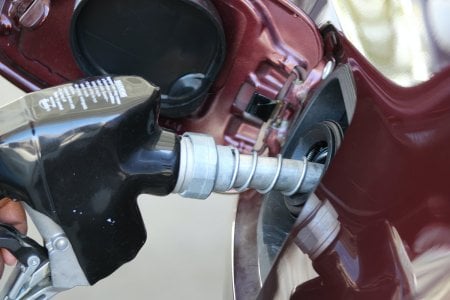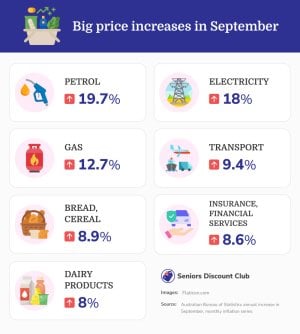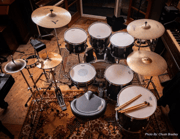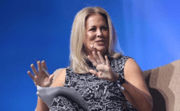Treasurer Jim Chalmers shares cost-of-living warning amid Middle East turmoil
Australian motorists are no stranger to pain at the bowser, but Treasurer Jim Chalmers has warned Aussies to brace for even higher petrol prices in the near future.
Australia's cost of living crisis has reportedly worsened, with inflation for the year to September reaching 5.4 per cent, leading to fears of a November interest rate rise.
In an ominous prediction, Dr Chalmers said the escalating conflict in the Middle East means petrol prices in the country will likely spike further.
'We expect some of these price pressures at the bowser to be potentially exacerbated by what we're seeing in the Middle East right now as well,' Chalmers told reporters on Wednesday, October 25.
The treasurer’s comments follow official Consumer Price Index (CPI) data showing a 19.7 per cent annual increase in automotive fuel prices in September, which has motorists paying up to $2.40 a litre for 95 octane premium unleaded.
‘Of course, these CPI figures predate the escalation of the conflict in the Middle East,’ Dr Chalmers added.
Motorists are currently paying 48.8 cents per litre in fuel excise due to the weaker Australian dollar, worth below 64 US cents, making imports more expensive.
However, Dr Chalmers has downplayed the possibility of halving the tax as the previous Coalition government did in March 2022, shortly before losing the last election.
‘Petrol prices were higher in the quarter, largely as a consequence of decisions taken by suppliers on the other side of the world but impacting Australian motorists here at home,’ he explained.
‘We recognise that, that's why we're rolling out this cost-of-living help, and it's why we are encouraged to see that it is working,’ he added.
Aside from petrol, electricity prices also soared by 18 per cent annually in September. But Dr Chalmers pointed out that energy bills would have been more costly if not for the Energy Bill Relief Fund rebates the government has rolled out.
He stated: ‘Without our energy relief, they would have gone up 18.6 per cent.’
‘This is the Australian Bureau of Statistics saying that the government's cost-of-living plan is taking some of the edge off these cost-of-living pressures,’ he continued.
Although the federal government intervened in the gas market and capped wholesale prices at $12 a gigajoule for a year, gas and electricity prices still increased by 12.7 per cent.
Shadow Treasurer Angus Taylor argued: ‘For the treasurer to suggest that Australians are better off is completely out of touch.’
Three major banks in Australia—Commonwealth Bank, ANZ and NAB —are anticipating a rate hike on November 7, following the bad inflation numbers.
This move by the Reserve Bank would increase the prevailing cash rate to 4.35 per cent—the highest it has been in 12 years. This would also be the 13th increase in just 18 months, making it the most aggressive tightening of monetary policy since 1989.
So brace yourself next time you fill up your tank—if Treasurer Chalmers’ prediction is correct, the worst could be yet to come at the petrol pump.

What are your thoughts on this, members? Do you have plans to stock up on petrol? Let us know in the comments below!
Australia's cost of living crisis has reportedly worsened, with inflation for the year to September reaching 5.4 per cent, leading to fears of a November interest rate rise.
In an ominous prediction, Dr Chalmers said the escalating conflict in the Middle East means petrol prices in the country will likely spike further.
'We expect some of these price pressures at the bowser to be potentially exacerbated by what we're seeing in the Middle East right now as well,' Chalmers told reporters on Wednesday, October 25.
The treasurer’s comments follow official Consumer Price Index (CPI) data showing a 19.7 per cent annual increase in automotive fuel prices in September, which has motorists paying up to $2.40 a litre for 95 octane premium unleaded.
‘Of course, these CPI figures predate the escalation of the conflict in the Middle East,’ Dr Chalmers added.
Motorists are currently paying 48.8 cents per litre in fuel excise due to the weaker Australian dollar, worth below 64 US cents, making imports more expensive.
However, Dr Chalmers has downplayed the possibility of halving the tax as the previous Coalition government did in March 2022, shortly before losing the last election.
‘Petrol prices were higher in the quarter, largely as a consequence of decisions taken by suppliers on the other side of the world but impacting Australian motorists here at home,’ he explained.
‘We recognise that, that's why we're rolling out this cost-of-living help, and it's why we are encouraged to see that it is working,’ he added.
Aside from petrol, electricity prices also soared by 18 per cent annually in September. But Dr Chalmers pointed out that energy bills would have been more costly if not for the Energy Bill Relief Fund rebates the government has rolled out.
He stated: ‘Without our energy relief, they would have gone up 18.6 per cent.’
‘This is the Australian Bureau of Statistics saying that the government's cost-of-living plan is taking some of the edge off these cost-of-living pressures,’ he continued.
Although the federal government intervened in the gas market and capped wholesale prices at $12 a gigajoule for a year, gas and electricity prices still increased by 12.7 per cent.
Shadow Treasurer Angus Taylor argued: ‘For the treasurer to suggest that Australians are better off is completely out of touch.’
Three major banks in Australia—Commonwealth Bank, ANZ and NAB —are anticipating a rate hike on November 7, following the bad inflation numbers.
This move by the Reserve Bank would increase the prevailing cash rate to 4.35 per cent—the highest it has been in 12 years. This would also be the 13th increase in just 18 months, making it the most aggressive tightening of monetary policy since 1989.
So brace yourself next time you fill up your tank—if Treasurer Chalmers’ prediction is correct, the worst could be yet to come at the petrol pump.
Key Takeaways
- Petrol prices in Australia may potentially increase due to both a 19.7 per cent annual rise in automotive fuel prices and the recent conflict in the Middle East.
- Motorists are now paying 48.8 cents a litre in fuel excise as the weaker Australian dollar that
is worth less than 64 US cents, making imports more expensive. - Australia's cost of living crisis has reportedly worsened, with inflation for the year to September reaching 5.4 per cent, leading to fears of a November interest rate rise.
- Treasurer Jim Chalmers downplayed the prospect of cutting the fuel tax and assured that they are rolling out a cost-of-living help plan. He also pointed out that the electricity price increase was curbed through the Energy Bill Relief Fund rebates in the May Budget.
What are your thoughts on this, members? Do you have plans to stock up on petrol? Let us know in the comments below!
Last edited:









